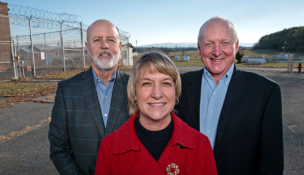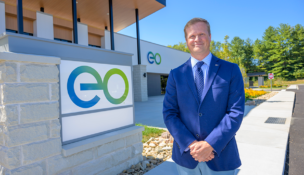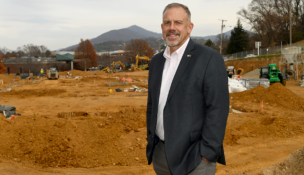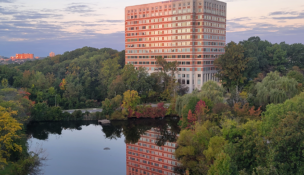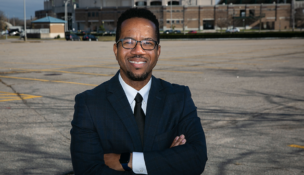
Developer Gregory Kaknes plans a $50 million development at a former foundry site in Roanoke. Photo by Natalee Waters

Developer Gregory Kaknes plans a $50 million development at a former foundry site in Roanoke. Photo by Natalee Waters
A second act for Roanoke’s Walker Machine and Foundry
Standing within hollering distance of the Roanoke River, Gregory Kaknes points toward an empty, 10,000-square-foot building.
“That’s the bar and grill,” he says. He turns the other direction and motions toward a large expanse of land covered in concrete. “The apartments are over there. … There’s where we’ll have outdoor music, pickleball courts, beach volleyball.”
Kaknes, a developer from Maine who lives part-time in Roanoke, has ambitious plans for a $50 million mixed-use commercial and residential development on about 8.4 acres of property where the former Walker Machine and Foundry made metal castings for 100 years before closing in 2019.
Kaknes, 64, discovered the foundry property while walking with his granddaughter along the Roanoke River Greenway, which passes the site. He was fascinated by the abandoned foundry in Roanoke’s Norwich neighborhood, which reminded him of New England towns where former industrial sites had been converted into living and dining spaces.
“I saw it not for what it was, or what it is, but what it could be,” says Kaknes, who started a successful organic recycling business in Massachusetts in the 1990s that he later sold.
His company, The Foundry Realty, plans for the property include eight pickleball courts, an indoor golf simulator and a sprawling restaurant that could host concerts, banquets and meetings.
On Jan. 21, Roanoke City Council approved rezoning the property from heavy and light industrial use to a recently created urban center district designation, which allows a mix of retail, office, residential and light industrial uses outside of the downtown area.
Kaknes says he will work with another developer, so far unnamed, on the residential component, and that he hopes to offset costs with funding from Virginia’s Industrial Revitalization Fund as well as Enterprise Zone and historic rehabilitation incentives. He expects to close on the property — which also includes an additional 10 parcels across Bridge Street where he hopes to build more housing — by March 31 and begin the project’s first phase this spring by developing the restaurant and outdoor sports sites.
Edward Moore, president of the foundry, which currently owns the site, gives the project his blessing.
“This area was mostly industrial, but that was in a world 50 years ago that’s no longer the case in Roanoke,” he says. “Roanoke is on a different path, a growing path.”
s




